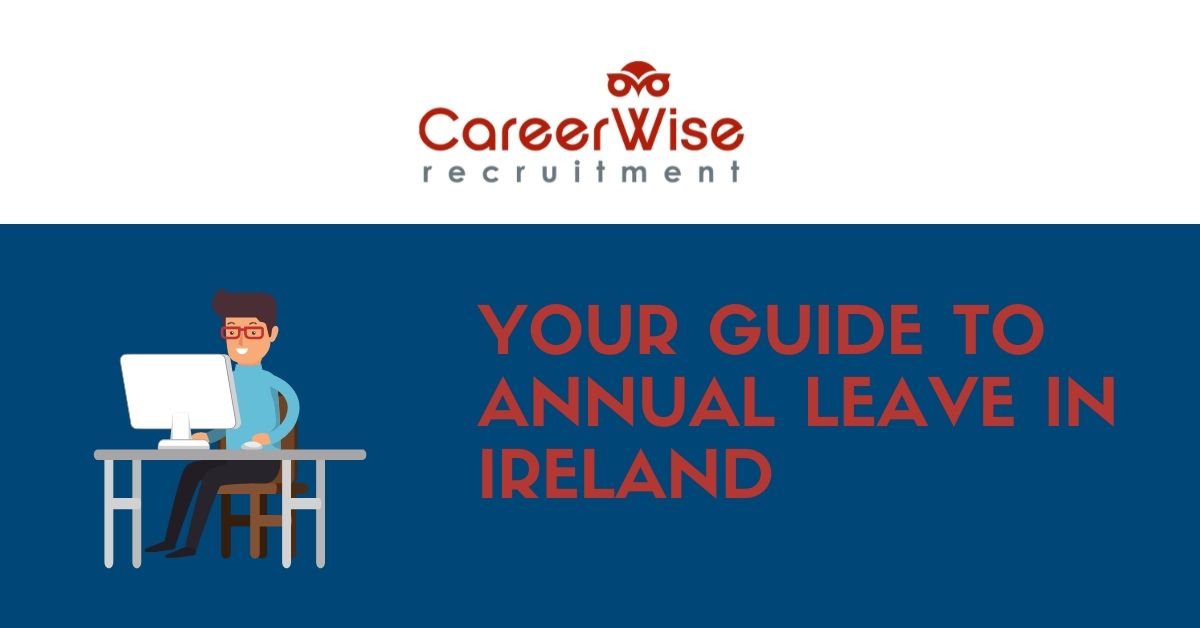
Do you know how much annual leave you are entitled to? Companies often have complex policies that leave employers confused about their entitlements, so we have created a quick guide to annual leave in Ireland to help.
Annual leave is defined as a holiday day during which you are entitled to receive your usual wages on your usual pay day. This can be more complicated if you work within the sales or recruitment industries, and if your pay is partly comprised of bonuses or commission, in which case you will be entitled to receive the average of your wages during the 13 week period prior to your holiday/annual leave.
Other types of leave that you may take throughout the year include maternity and paternity leave, carer’s leave and public holidays, but these do not affect your annual leave rights. Your employer has the right to refuse an annual leave request, but must take into account your family responsibilities, your right to take opportunities to rest, and your right to be informed of any changes to your annual leave at least a month before it occurs. Your company may also have stipulations about when your leave can be taken, for example, many tourism providers will restrict leave during high season.
All full-time workers in Ireland are entitled to receive 20 paid holidays days each year, although many companies include more than this within their contracts.
Your employment contract with your employer should set out exactly what you are entitled to, although this can be more complex if you work part time or take sick leave during the year. Your contract should also tell you whether you are entitled to carry any unused holiday days through to the following year, as this is not a statutory requirement.
Annual leave should never be used to cover periods of time when you are unable to work due to illness, and if you are ill while you are on annual leave, you can visit your doctor to obtain a medical certificate and retain your annual leave allocation for a later date.
Since the Workplace Relations Act 2015 was amended in 2015, the following changes have been in effect:
Your entitlement to annual leave is not affected by any other type of leave you take from work. For example, your entitlement to maternity leave, adoptive leave, parental leave, force majeure leave and the first 13 weeks of carer’s leave is not affected by annual leave taken, and you will continue to accrue annual leave while you are on any of these forms of leave.
Public holidays are not included in your 20 day annual leave entitlement, and these apply to all full-time and most part-time workers in Ireland. If you have to work on a public holiday, you will be entitled to either an additional day of annual leave or an additional day’s pay.
There are nine public holidays in Ireland, and these are New Year’s Day, St Patrick’s Day, Easter Monday, the first Monday in May, June and August, the last Monday in October, Christmas Day and St Stephen’s Day (Boxing Day). Many businesses also close on Good Friday, but this is not an official paid public holiday. Arrangements for closure during the Christmas and New Year period will vary between companies, and you should discuss this with your employer and check your contract carefully.
Public holiday entitlement may vary if you work part time, and employers who have not worked 40 hours in total in the five week period before the public holiday will not be entitled to take the day off or to any additional pay. Most part-time workers, however, will be entitled to take the public holiday as a day off, or to receive an additional day’s pay if they are required to work.
If you decide to leave your job, you will be entitled to receive payment for any outstanding annual leave that you have accrued but not taken, as well as any public holidays due to you. There is no other circumstance in which you can be paid an allowance instead of taking the annual leave you are entitled to.
The standard annual leave entitlement in Ireland is 4 weeks, which equates to 20 days if you work a five day week, or 24 if you work a 6 day week. This is in addition to legislation which states that your employer is legally required to ensure that you have at least 24 consecutive hours of rest in each period of 7 days.
There are three different ways to calculate your annual leave entitlement:
Legally, an employee can use whichever of these methods gives the greater entitlement, and can include all hours worked, including time spent on annual leave, maternity leave, parental leave, force majeure leave, adoptive leave or the first 13 weeks of carer’s leave.
Additionally, if an employee has worked for at least 8 months, they will be entitled to an unbroken period of two weeks of annual leave.
For part time workers, annual leave is generally calculated using method 3, giving an allocation of annual leave equal to 8% of hours worked. Where an employee works part time for part of the year and full time for another part of the year, the annual leave allocations can be calculated separately.
Remember that some companies may give their employees more than 20 days holiday per year, and this will be detailed in your employment contract.
CareerWise is Ireland’s leading specialist recruitment firm, based in Cork, Shannon, Galway and Mayo, and our professional team can help you to find the new job you have been dreaming of. We take the time to get to know our clients so that we can find the very best opportunities to suit their experience and skillsets, and we work closely with the best of local, national and multinational companies in Ireland.
We specialise in finding new roles for excellent candidates in the Engineering, Supply Chain, Science/Pharma, IT and Accounting industries in Ireland, and we look forward to working with you. Contact us online now or call us on +353 (0) 21 206 1900 to arrange a consultation.

Joe Robbins is co-founder of CareerWise Recruitment. A graduate of the University of Limerick (Degree in Business Studies, 1985), Joe worked in the UK for five years where he specialised in materials management, production management and plant management for a number of companies.
He returned to Ireland in 1992 to become Operations Manager for a Cork-based start-up, FMC Automotive Division which was subsequently taken over by Snap-on Equipment. Joe managed the business re-location of this company to Shannon in 1997 before setting up CareerWise Recruitment in 1999.
He is a committee member of the Chartered Institute of Personnel and Development (CIPD) Mid-West region, and a former Director and Vice President of the Shannon Chamber of Commerce. Joe is former Chairperson of the Sixmilebridge Camogie Club and current Chairperson of the Clare County Camogie Board.
CareerWise Recruitment. EastGate Village, EastGate, Little Island, Cork.
Phone: +353 (0) 21 206 1900
Email: info@careerwise.ie